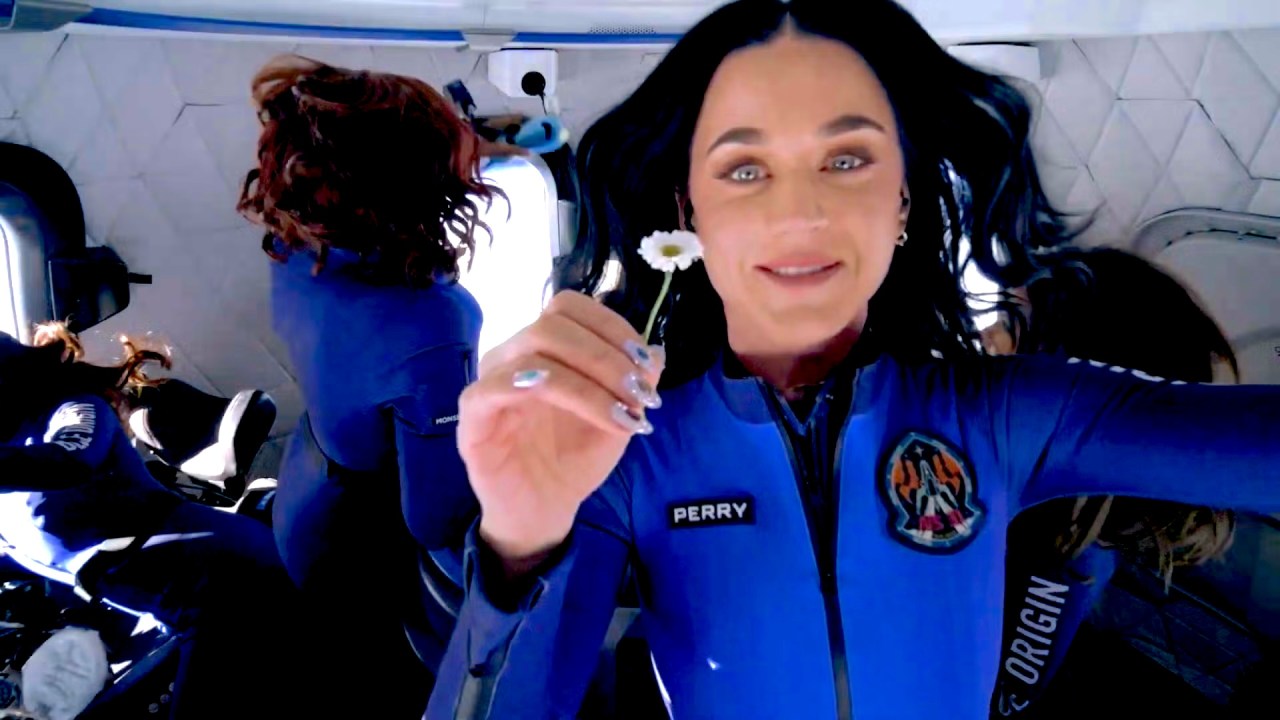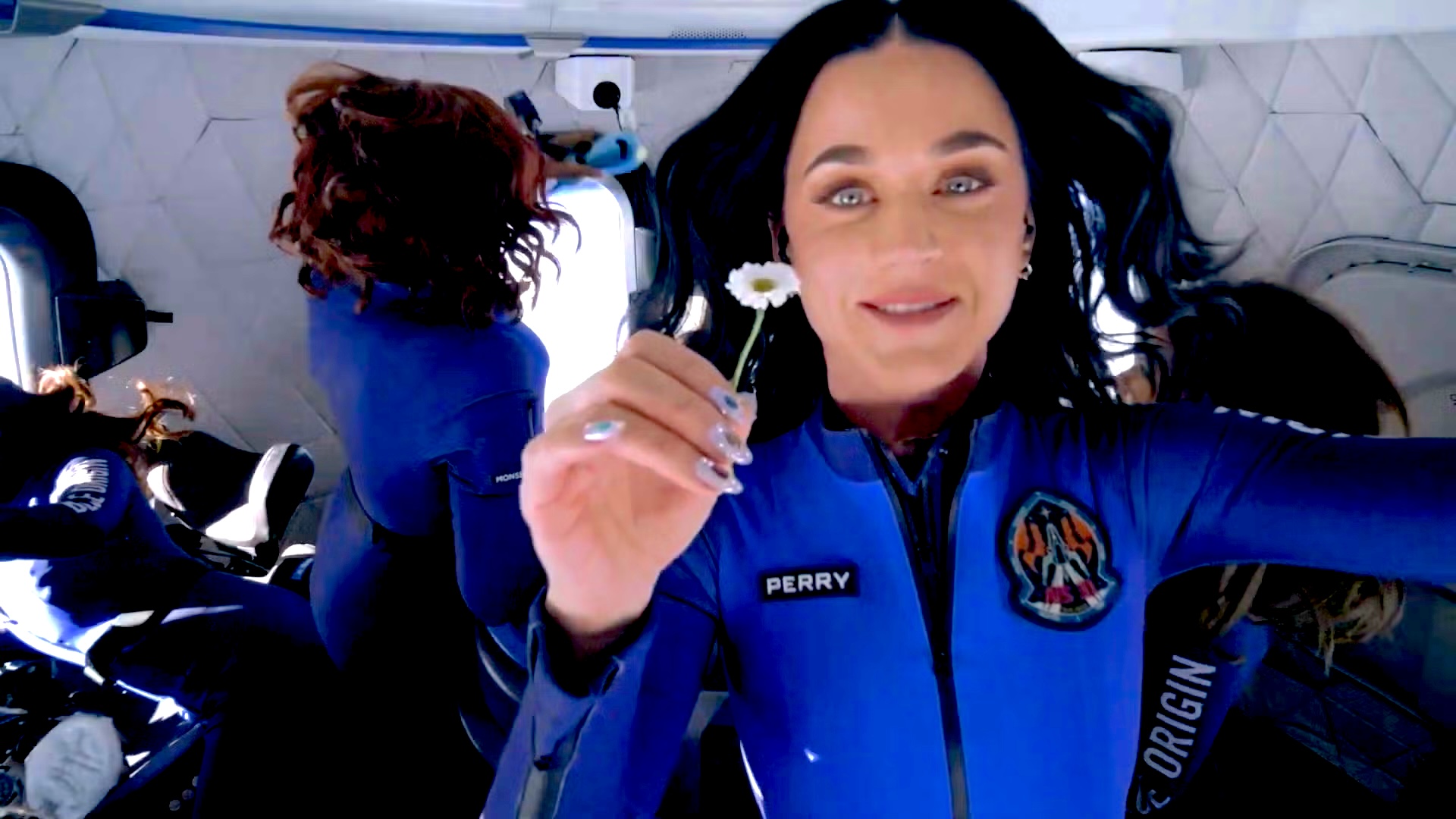Last month, Katy Perry became the first pop star to go to space. The Blue Origin flight took only 11 minutes and involved her singing to Planet Earth. She had no idea the planet would hate her on her return. Much of the criticisms included phrases like ‘waste of money and resources’; some even mentioned an ‘ongoing genocide’. She has defended herself in strange self-help metaphors, as the biggest pop stars are wont to do. ‘Through my battered and bruised adventure I keep looking to the light and in that light a new level unlocks,’ she said.
‘It’s so out of touch,’ said Lily Allen, who has since apologised for singling her out – there were five other women on the ship. Perry was mocked on social media after theatrically kissing the ground, and by YouTuber Matt Walsh after talking about feeling connected to the ‘strong divine feminine’.
Everyone has the wrong idea. Pop stars exist to be outrageous, self-aggrandising and out of touch. They always have. If Michael Jackson were alive today he’d definitely have tried to go to space too. The same man got his PR ideas from a biography of circus founder P.T. Barnum; he planted rumours in the press about his use of a life-extending cryogenic tank and his obsession with the bones of the Elephant Man.
When Madonna was Katy Perry’s age she became showily enchanted with Jewish mysticism and only spoke to interviewers with her eyes closed, as if stuck permanently in a state of intellectual thought. I only started to like Taylor Swift once I found out about her obsession with the Kennedy family; even before beginning a tryst with RFK Jr’s son, she was photographed in a mid-century dress, leaving flowers at the grave of JFK.
Today’s pop stars are an extension of classic literature. If you’re looking for melodrama, polyphonic rumour and ancestral intrigue in the vein of Dickens and Hardy, your best bet is to skip the Booker shortlist and go straight to the front page of the MailOnline. Michael Jackson went from Dickensian urchin to Dickensian bandit to Dickensian spinster. Madonna sits at the vanguard of literary modernism: she’s got the spiritual sexuality of Ursula Brangwen from D.H. Lawrence’s The Rainbow and the sickly, aristocratic conceit of a bicoastal Henry James heroine. (One biographer alleges she is Queen Camilla’s ninth cousin, once removed.) Perry carries both of these qualities forward into 2020s pop culture, but with an adventurous twist: you can imagine the 11-minute spaceflight as a doomed set piece written by Joseph Conrad.
No wonder none of it is landing: millennials appear to have some sort of mental block when it comes to high literary drama. They’ve sacrificed imagination on the altar of relatability, so conceited pop stars have become mysteries. The relatable turn exists everywhere in women’s pop culture: Sex and the City gave way to the grey self-awareness of Lena Dunham’s Girls; the ‘sex and shopping’ novel has given way to the quiet minimalism of Sally Rooney, who lacks out-of-body moments and is rarely funny.
This cultural turn has blighted Perry in other ways. Last year, the video for her comeback single, ‘Woman’s World’, evoked widespread outrage. ‘As the video demonstrated,’ said one Guardian commentator, ‘you could be a Rosie the Riveter type (but, like, hot), or a businesswoman or a big sexy bionic horse. Women can have it all! Thank God someone finally said it.’ She thought she was mocking Perry, but she accidentally reiterated the point of the video.
To anyone outside the millennial bubble, the message seems obvious – it’s difficult to look at ‘Woman’s World’, with its surreal lighting and hectic streetscapes, without seeing the deliberate comedic influence of 1990s fashion photographer David LaChapelle. At the end, when Perry flies off in a helicopter with a bemused TikToker’s iPhone, the slow-motion shots and self-satisfied narration scream ‘parody’. When it’s revealed the other woman has no idea who Perry is, we realise this is an artist making fun of herself – as a 40-year-old pop star, she’s out of touch with the kids.
TikTokers have tried to turn the Katy Perry debacle into a simple matter of targeting. ‘The millennial women who bought into the Katy Perry persona in the 2010s,’ explained one, ‘are now in their thirties with a bit more cash, a bit more stress and a bit more cynicism… a woman who’s struggling to pay for daycare doesn’t want to see the Katy Perry character be flown to space by a billionaire.’ But millennial women were never actually her crowd. As with almost every high-quality and campy pop turn since ‘Like a Virgin’, Perry’s early-career audience was made up of gay men and little girls.
The hypothesis that poorer fans demand more cynicism makes little sense when you look at tastes during the Great Depression; Shirley Temple was one of the biggest stars around, and there were endless musical spectacles in cinemas with titles like Fashions of 1934. What’s going on is much larger. The pop world continues to extol camp while culture as whole turns against it. Perry annoys millennials because her confidence goes beyond the accepted parameters of 2010s feminism. She doesn’t need to be accountable or self-conscious – she’s ridiculous and takes her own ridiculosity seriously.
Perry’s early-career audience was made up of gay men and little girls
There is still hope: my cynical generation seems to be reviving the art of the image. Celebrity TikToker Addison Rae is the most interesting pop-culture fixture in ages because her ascension is based, purely and deliberately, on the ascensions of others. A recent photoshoot referenced an obscure Madonna video installation; viral paparazzi shots show her reading Britney Spears’s memoir while walking down the street; and she claimed in a Rolling Stone profile that the only form of decoration in her new house is a framed photograph of Judy Garland.
For Gen Z, this is a public service. There are so few signs of historical continuity in our lives, it’s inspiring to see someone else set themselves up as the claimant to a continuing legacy – like a Chinese emperor vying for the Mandate of Heaven. And it’s refreshing to see someone like Perry openly hunting for celebrity, rather than pretending it has crept up on her sideways in order to blame the public for a more-or-less natural interest.
Delusion should be considered prerequisites for stardom, not unfortunate side-effects. Narcissism is fine if you give us a proper show in the process; self-obsession is only grating when used as a pretext for monotonous podcasts and personal essays. Katy Perry isn’t wasting resources – she’s reinjecting society with the things it has nearly lost. One day everyone else will be sorry.








Comments